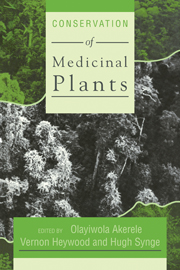Book contents
- Frontmatter
- Contents
- Contributors
- Preface
- Acknowledgements
- The Chiang Mai Declaration
- Introduction
- The Issue of Medicinal Plants
- Science, Industry and Medicinal Plants
- Techniques to Conserve Medicinal Plants
- Policies to Conserve Medicinal Plants
- Experiences from Programmes to Conserve Medicinal Plants
- 21 Medicinal Plants in India: Approaches to Exploitation and Conservation
- 22 The Chinese Approach to Medicinal Plants – Their Utilization and Conservation
- 23 Conservation of Medicinal Plants in Kenya
- 24 Complexity and Conservation of Medicinal Plants: Anthropological Cases from Peru and Indonesia
- 25 Utilization of Indigenous Medicinal Plants and their Conservation in Bangladesh
- 26 Development of a Conservation Policy on Commercially Exploited Medicinal Plants: A Case Study from Southern Africa
26 - Development of a Conservation Policy on Commercially Exploited Medicinal Plants: A Case Study from Southern Africa
Published online by Cambridge University Press: 07 September 2010
- Frontmatter
- Contents
- Contributors
- Preface
- Acknowledgements
- The Chiang Mai Declaration
- Introduction
- The Issue of Medicinal Plants
- Science, Industry and Medicinal Plants
- Techniques to Conserve Medicinal Plants
- Policies to Conserve Medicinal Plants
- Experiences from Programmes to Conserve Medicinal Plants
- 21 Medicinal Plants in India: Approaches to Exploitation and Conservation
- 22 The Chinese Approach to Medicinal Plants – Their Utilization and Conservation
- 23 Conservation of Medicinal Plants in Kenya
- 24 Complexity and Conservation of Medicinal Plants: Anthropological Cases from Peru and Indonesia
- 25 Utilization of Indigenous Medicinal Plants and their Conservation in Bangladesh
- 26 Development of a Conservation Policy on Commercially Exploited Medicinal Plants: A Case Study from Southern Africa
Summary
Introduction
The majority of the population of many developing countries use traditional medicines either because people cannot afford western pharmaceuticals or because traditional medicines are more acceptable. The southern African region is no exception. Recent studies in Botswana (Staugard, 1985), Zimbabwe (Gelfand et al., 1985) and South Africa (Berglund, 1976; Cunningham, 1988; Ngubane, 1977) all document the important role that traditional medicines plays in the lives of people in rural and urban communities in southern Africa. This urban demand for traditional medicines generates a commercial trade in medicinal plants from rural source areas to urban markets and shops.
Commercial exploitation of medicinal plants has important implications for their conservation and management. Using medicinal plants was formerly a specialist activity of traditional practitioners, who had a limited effect on plant resources (Figure 1). Commercial harvesters (who are not trained traditional practitioners, but are rural people otherwise unemployed) are the main suppliers of traditional medicinal plants to urban areas, with disastrous effect on many popular species (Cunningham, 1988). The effects of this trade are most clearly seen in the ring-barking of tree species that are a source of popular medicinal barks (Figures 2 and 3). The trade in herbal medicine is well developed in South Africa due to the large size and rapid growth of urban populations and is on a scale that is cause for concern amongst conservation organisations and rural herbalists (Cooper, 1979; Cunningham, 1984,1988; Gerstner, 1946; MacDonald, 1984).
Over-exploitation of popular plant species as a result of this trade is not a new problem. Local depletion of the Swamp Forest climber Mondia whitei was recorded in Natal province, South Africa, in 1898 (Medley Wood & Evans, 1898).
- Type
- Chapter
- Information
- Conservation of Medicinal Plants , pp. 337 - 358Publisher: Cambridge University PressPrint publication year: 1991
- 22
- Cited by



